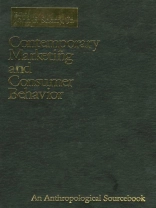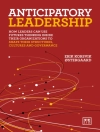Scholarly and extensively footnoted, the book is meant to be used as a sourcebook for anthropological research. . . . The book′s primary audience should be marketing and anthropology researchers, and graduate students, faculty, and researchers. –P. G. Kishel in Choice ‘As a business person responsible for the development of advertising strategies and advertising campaigns, I was impressed with the contributors′ willingness and desire to apply anthropological principles to real world problems. John Sherry Jr.′s comment sums it up nicely, ′Anthropology is a practical discipline, anchoring the blue sky thinking it encourages firmly to the local ground it inhabits.′ We need to encourage blue sky thinking so we don′t repeatedly get the same answers to our inquiries. Anthropologists can help us with these issues. . . ‘This book gives me enormous hope that applied anthropology will help restore the tremendous value that can be gained through qualitative research techniques. Today in marketing and advertising, focus groups are grossly overused, misused, and underanalyzed. I was encouraged and excited about the authors′ discussions of good ethnographies and focus groups that, for example, instead of simply asking respondents whether or not EMF causes cancer, a far more creative and insightful exercise was performed with consumers, and then was intensely analyzed by anthropologists. All too often today, qualitative research is carelessly and quickly administered and the analysis consists of a 30-minute debriefing at the end of the last focus group. . . ‘In the last few years, the need for cross-cultural consumer understanding has grown rapidly. This phenomenon makes it imperative that not only must we fully understand the meanings of brands and products to our domestic consumers, but we must know which meanings are ′transportable′ to consumers in other cultures. John Sherry Jr.′s book suggests that anthropologists could and should have a major role in cross-cultural consumer understanding.’ –Patricia A. Cafferata, President and Chief Executive Officer, Young & Rubicam Chicago ‘John Sherry Jr. and his contributors bring ′marketplace anthropology′ out of the shadows and into the dazzling piazza of contemporary social thought. Wide-ranging, lively, and often witty, the sourcebook raises many intriguing questions about the trajectory of anthropology and social science in general for the 21st century. Though readers might not always agree with the approaches used, these chapters are pointed reminders of vast fields of anthropological neglect on subjects of huge importance for today′s world, yet inspirations for the work reach back to the foundations of modern anthropology, from Malinowski to W. Lloyd Warner. . . ‘This book makes a convincing case for the role of marketplace anthropology in basic research on humankind. While many anthropologists might approach this collection with some apprehensiveness, the editor does not shrink from the ethical issues of business anthropology. Applied anthropologists in many fields can benefit from the insights and ideas presented here. This book goes a long way toward replacing the pop-anthropology so rampant in corporate circles these days with substantive anthropological materials and sets of ideas on advertising, organizational behavior, buying and selling, profit-making, consumer relations, and much more.’ –J. Anthony Paredes, Florida State University ‘Anyone concerned with understanding the consumer will find John F. Sherry Jr.′s new book invaluable. In the past decade, the most important contributions to the meaning of products, brands, and advertising in consumers′ lives have come from anthropology. Sherry and the contributors to this volume have been in the forefront of that movement. The chapters in this volume, whether on shampoo, electric utilities, or life histories of brand behavior, capture the excitement and illumination of looking at marketing and advertising through the lens of anthropology.’ –Myra Stark, Saatchi & Saatchi Advertising ‘This book is long overdue; anthropologists as consumer researchers have been a powerful underground force for the past 15 years of innovative marketing. Major companies, as well as government and private institutions, have looked to anthropologists to help when other research has failed. John Sherry Jr. has collected outstanding anthropological practitioners in this volume, and they have written cutting-edge chapters on product symbolism, consumer culture, advertising efficacy, and international marketing. The power of this collection lies in the fresh insights to each of these themes and the ability to reframe old problems to reperceive what it means to live the life of a consumer as we approach the next century.’ –Steve Barnett, Managing Director, Global Business Network Containing original articles and empirical substance, Contemporary Marketing and Consumer Behavior responds to a growing demand for scholarship more tuned to the empirical and practical realities of consumer culture. Written by leading anthropologists who specialize in marketing and consumer research, it is intended as a sourcebook for readers interested in consumption and its managerial consequences. The topics and their treatments run a gamut of concerns including elements of the marketing mix (such as goods and services), advertising and promotion, relationship management, managerial intervention and development, class-and-gender-linked consumer behaviors, and the production of consumption. Anthropological perspectives and methods employed by the authors range from materialistic to semiotic and both qualitative and quantitative methods are employed. Contributors range across time, space, and topics in pursuit of understanding. The result is a multifaceted perspective of marketing and consumer behavior. Also, the remarks of eminent senior Fellows of the Association for Consumer Research, who have drawn upon anthropology to make their own seminal contributions to a number of disciplines, punctuate this exceptional volume. A remarkable and extraordinary text, Contemporary Marketing and Consumer Behavior is ideal for scholars, students and professionals in marketing, cultural studies, gender studies, psychology, sociology, anthropology, and communication.
Jadual kandungan
Foreword – Sidney J Levy
Introduction – John F Sherry Jr
PART ONE: ORIENTATION
Marketing and Consumer Behavior – John F Sherry Jr
Into the Field
PART TWO: APPREHENDING THE PRODUCT: ARTIFACTUAL DIMENSIONS OF CONSUMER BEHAVIOR
Active Ingredients – Dan Rose
Consumer Behavior Reflected in Discards – Masa Kazu Tani and William L Rathje
A Case Study of Dry-Cell Batteries
PART THREE: MANAGING CHANNEL RELATIONS AND ORGANIZATIONAL CHANGE: INTERNATIONAL AND INTERFUNCTIONAL ASPECTS
West African Marketing Channels – Eric J Arnould
Environmental Duress, Relationship Management, and Implications for Western Marketing
Anthropology and Total Quality Management – Richard H Reeves-Ellington
Improving Sales Force Performance in Overseas Markets
PART FOUR: HEARING THE CUSTOMER′S VOICE(S): CONTEXTUAL GROUNDING OF MARKETPLACE BEHAVIOR
The Social Organization of Consumer Behavior – Janeen Arnold Costa
Brand Loyalty and Consumption Patterns – Barbara Olsen
The Lineage Factor
Amidword – Gerald Zaltman
Anthropology, Metaphors, and Cognitive Peripheral Vision
PART FIVE: COMMUNICATING THROUGH ADVERTISEMENTS: CONSIDERATION OF THE CRAFT
Malinowski, Magic and Advertising – John Mc Creery
On Choosing Metaphors
Speaking to Customers – Rita Denny
The Anthropology of Communications
PART SIX: BEING IN THE MARKETPLACE: EXPERIENTIAL CONSUMPTION
Learning to `See′ – Carole Duhaime, Annamma Joy and Christopher Ross
A Folk Phenomenology of the Consumption of Contemporary Canadian Art
Monadic Giving – John F Sherry Jr, Mary Ann Mc Grath and Sidney J Levy
Anatomy of Gifts Given to the Self
PART SEVEN: CONCLUSION
Anthropology of Marketing and Consumption – John F Sherry Jr
Retrospect and Prospect
Afterword – William D Wells












